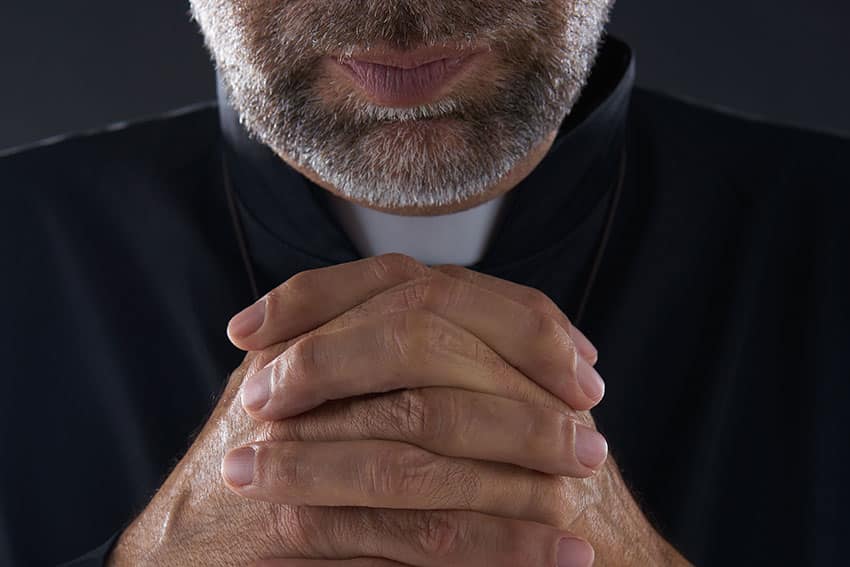
One of the many positive fruits of the Royal Commission is an increased attentiveness to the poison of clericalism: the misuse of a service to take for myself rather than giving of myself and, more importantly, God. Clericalism has no place, of all places, in the Catholic Church. It’s against the Gospel. It’s a sin. It’s from the devil. It’s not part of God’s plan. And it’s a good obstacle to evangelisation.
Being a cleric, on the other hand, is something totally different. If there are clerics anywhere, their place is first and foremost at the very heart of the prayer, activity and mission of the Church and in the lives of her members.
Why? It’s because of what a cleric is. The English ‘cleric’ is derived from the Latin clericus, in turn from the Greek kleros – “lot, portion”: those whose portion is the Lord.
Shepherd and brother
A cleric is someone who belongs totally to the Lord for the Lord’s own ends, which are always good and wholesome and fruitful. Properly lived, a cleric is so given to the Lord that he resembles him – a good shepherd who patiently bears the bites of the wolves, the cold and fatigue of the dark nights, for love of his sheep and for the Lord. And he is a brother. So of course we want clerics in the Church, and we want more of them. This is the point of the Roman collar: to announce to the priest himself and to all around him that only in the total gift of ourself to God do we find fulfilment. It’s sometimes suggested that, if only we stopped this ontological change thing – that at ordination the man’s soul is marked with an irremovable priestly ‘character’ – priests wouldn’t become clericalist. There are many problems with this idea.
Lay clericalism not the answer
For starters – you don’t need to be a priest to be clericalist, to abuse one’s service. Lay people do it all the time, women just as well as men, inside and outside the Church and its organisations – as we have all unfortunately experienced. This is unsurprising: lay people, like priests, are wounded sinners. Stopping blokes from being clerics won’t change this.
you don’t need to be a priest to be clericalist, to abuse one’s service. Lay people do it all the time, women just as well as men, inside and outside the Church
The other problem is that it’s a bit strange for ontologically changed people to criticise the fact that others are ontologically changed. What do I mean? I mean that if you are baptised, your soul also has received an irremovable character – that of baptism. You are not the same as those who are not baptised: you are different. You are not ‘better’, you have the same human dignity, you are loved ‘equally’ infinitely by God – but you are not the same as them. That’s the point of our baptism: to free us from sin and set us aside to belong to God.
The faith that makes us different
This is why a Catholic lifestyle is different to that of non-Christians. While we share the rich tapestry of our common humanity and our deep Australianness – our priorities are not the same, nor in the same order, nor lived or realised in the same way. Our morality is not the same. Our goals are not the same: You shall love the Lord your God with all your heart, and with all your soul, and with all your mind. This is the great and first commandment. And a second is like it: you shall love your neighbour as yourself. Christian prayer is radically different to that of other religions. Our reasons for hope are different. And just as well – compared to the empty, depressing and lonely pointlessness of secular atheism. We don’t want that for ourselves or our children.
But being different is not always comfortable. For all of us there is always the easy slope of ‘fitting in’, compared to the rising hill of the very different requirement of Jesus: If any man would come after me, let him deny himself and take up his cross and follow me.
And perhaps this is the heart of the problem. That great terror, the fear of being different. Or as St Paul says, a disordered love of the same, which is a problem, first of all because it’s a rejection of God – for God is different, what he gives is always new, and it is a closure of heart to him. An incapacity to welcome the fact that what God asks of me is not the same as that of the others. It’s a fear to which we shouldn’t pander in the suppression of different states of life in the Church, but which needs to be integrated in face of the reality that, whoever I am, the very fact that I exist as a human being means I am different to everybody, that I am absolutely unique. And that I will find peace not in panicking everybody into being the same as the wider society, but rather of integrating myself, and assisting others, into the vision that God has for me, as communicated to us by Jesus through the Church he instituted to do so.
Related
- Fr Josh Miechels: faith possible despite restrictions
- Fr Josh Miechels: the French village that touches God
